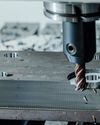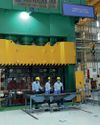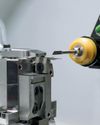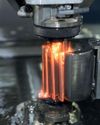Today’s Most Advanced Automation Systems Have Additional Capabilities Enabling Their Use In Environments That Have Not Been Suitable For Automation Up To Now

MANUFACTURING AUTOMATION HAS BEEN around since the 1970s. Much advances in technology, including robotics, big data, machine learning, artificial intelligence, and the Internet of Things have improved factory production since then.
Cheaper, more capable, and more flexible technologies are accelerating the growth of fully automated production facilities. The key challenge for companies will be deciding how best to harness their power.
This “lights out” production concept—where manufacturing activities and material flows are handled entirely automatically—is becoming an increasingly common attribute of modern manufacturing. In part, the new wave of automation will be driven by the same things that first brought robotics and automation into the workplace: to free human workers from dirty, dull, or dangerous jobs; to improve quality by eliminating errors and reducing variability; and to cut manufacturing costs by replacing increasingly expensive people with ever-cheaper machines. Today’s most advanced automation systems have additional capabilities, however, enabling their use in environments that have not been suitable for automation up to now and allowing the capture of entirely new sources of value in manufacturing.
As robot production has increased, costs have gone down. Over the past 30 years, the average robot price has fallen by half in real terms, and even further relative to labor costs. As demand from emerging economies encourages the production of robots to shift to lower-cost regions, they are likely to become cheaper still.
Diese Geschichte stammt aus der May 2019-Ausgabe von Manufacturing Today.
Starten Sie Ihre 7-tägige kostenlose Testversion von Magzter GOLD, um auf Tausende kuratierte Premium-Storys sowie über 8.000 Zeitschriften und Zeitungen zuzugreifen.
Bereits Abonnent ? Anmelden
Diese Geschichte stammt aus der May 2019-Ausgabe von Manufacturing Today.
Starten Sie Ihre 7-tägige kostenlose Testversion von Magzter GOLD, um auf Tausende kuratierte Premium-Storys sowie über 8.000 Zeitschriften und Zeitungen zuzugreifen.
Bereits Abonnent? Anmelden

Optimising milling operations
Exploring innovative strategies that are reshaping the milling landscape to meet the challenges of a competitive global market.

The path to excellence
Tata AutoComp’s Double Deming triumph is testament to quality and innovation

Boosting India's energy efficiency with advanced low voltage motors
Stefan Floeck, Division President of IEC Low Voltage Motors at ABB Motion, discusses the role of low voltage motors in India’s industrial future.

The Tech of E-commerce
Technology is revolutionising e-commerce by enhancing demand forecasting, inventory management, and customer experiences through AI, blockchain, IoT, and real-time data analytics.

Driving Sustainability and Innovation
A conversation with Rajendra B Chunodkar, President Manufacturing Operations, Lupin

The evolution of machining technologies
The evolution of machining technologies is reshaping the manufacturing landscape, offering unprecedented opportunities for efficiency, precision, and sustainability.

Transforming the future of manufacturing technology
A pre-event report on IMTEX 2025: The premier manufacturing and metal cutting technologies event for

THE MAKE IN INDIA JOURNEY
An analysis of the initiative's impact on the manufacturing sector.

Tata Motors Re.Wi.Re: Innovation meets responsibility
Tata Motors advances circular economy via Re.Wi.Re scrapping facility.
After Apple, Google Pixel set to be manufactured in India
Dixon Technologies' alliance with Compal Electronics is poised to further accelerate India's push to become a global hub for smartphone manufacturing.